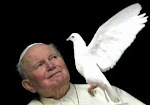Saturday, March 27, 2010
John Henry Cardinal Newman to be Beatified in September 2010
John Henry Cardinal Newman will be Beatified by The Holy Father in September of this year. Cardinal Newman was born in 1801 and died at the age of 89 . He had become an Anglican clergyman. In 1845 and through his preaching and his theological writing came to the knowledge that the fullness of truth was to be found in The One Holy Catholic and Apostolic Church and joined her. In 1879 the Holy Father made Newman a Cardinal.
After his death in 1890 Cardinal Newman was forgotten. In 1978 a book was published of his sermons under the title, "Newman against the Liberals" The preface was written by Michael Davies and the introduction by The Rev. Philip Flanagan, D.D. This blog is dedicated to contesting many positions coming out of the Second Vatican Council referred to as, "The spirt of Vatican II" .
On page 20 in the introduction to the work of Newman referred to above it says. quoting Newman, " First was the principle of dogma; my battle was with liberalism. By liberalism I meant the anti-dogmatic principle and its developements." Father Flanagan goes on to quote Newman elsewhere about the principle of the Liberals. "That truth and falsehood in religion are but matter of opinion; that one doctrine is as good as another; that the Governor of the world does not intend that we should gain the truth; that there is no truth; that we are not more acceptable to God by believing this than by believing that; that no one is answerable for his opinions; that they are a matter of necessity or accident; that it is enough if we sincerely hold what we profess; that our merit lies in seeking, not in possessing; that it is a duty to follow what seems to be true, without a fear lest it should not be true; that it may be a gain to succeed, and can be no harm to fail; that we take up and lay down opinions at pleasure; that belief belongs to the mere intellect, not to the heart also; that we may safely trust to ourselves in matters of Faith; and need no other guide_ this is the principle of philosophies and heresies, whch is very weakness."
Against this liberal mentality Newman based himself on what he called the dogmatical principle, "which he describes thus: "That there is a truth then; that there is one truth; that religious error is in itself of an immoral nature; that its maintainers, unless involuntarily such, are guilty in maintaining it, that it is to be dreaded; that the search for truth is not the gratification of curiosity; that its attainment has nothing of the excitement of a discovery; that the mind is below truth, not above it, and is bound not to discant upon it, but to venerate it; that truth and falsehood are set before us for the trial of our hearts; that our choice is an awful giving forth of lots on which salvation or rejection is inscribed, that before all things it is necessary to hold the Catholic faith, ' that he who would be saved must thus think ' and not otherwise."
Subscribe to:
Post Comments (Atom)




No comments:
Post a Comment